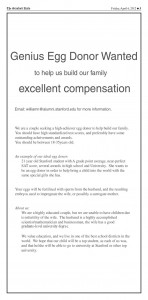
On May 1 2012, a remarkable event occurred at the Bechtel International Center on the Stanford campus.
Sponsored by Stanford’s Office of Diversity and Leadership and Women’s Community Center, the program on human egg donation brought together Judy Norsigian, famed pro-choice feminist author of Our Bodies, Ourselves, and Jennifer Lahl, award-winning pro-life producer of Eggsploitation – two women with notably divergent views on abortion and the sanctity of unborn life.
Both women delivered the same message to young women targeted by aggressive recruitment and lucrative compensation for donating their eggs: Don’t Do It.
The message was timely. Less than 30 days prior, this privately placed ad appeared in the Stanford Daily. 
Young women know that these sorts of ads appear regularly on college campuses. Our young women know that, under the cover of “helping” less fertile, often older women and male same sex couples become parents, they are targeted for solicitation, harvesting and purchase of their eggs, much like a flower merchant with a great bulb to offer.
Young women know this – and they know that no one is offering much advice or protection. Why are the adults so silent on this experimental commoditizing of our young women? The technology is relatively new and, before Lahl’s Eggsploitation revelations, largely occurred below media radar, within the confines of medical confidentiality. But older adults also remain silent in part from sheer ignorance of the industry’s unregulated marketing assault on young women. If you haven’t seen these ads, it’s hard to believe. Well educated adults, like this one, don’t realize that the industry is making a commercial market in human eggs extracted from young women – and they think ads like the one in the Stanford Daily “must be a joke; a late-running April Fool’s spoof.”
On the other hand, lots of people – lots of older women to be precise – know that it’s no joke at all. In fact, it is often older women who patronize this industry, an organic human egg collective where consumers can pick and choose the particular product that suits their tastes.
I don’t care how much money you pay these young women, it’s exploitative to turn desireable, fertile young women into a series of products which less desireable, less fertile older women (and men) can purchase. From a feminist perspective, there is so much wrong with the human egg industry, it’s surprising that women are not demonstrating with signs “Hands Off My Eggs” or “Keep Your Dollars To Yourself” or “My Daughter’s Not for Sale.” The Stanford event – and the appearance of Norsigian and Lahl united on this issue – finally gives purchase to some push-back as we belatedly realize that those targeted young women are our daughters, our nieces, our friend’s child – not egg harvesters’ guinea pigs.
Pushback is desperately needed. Eggs are harvested from our young women using a untested, experimental procedure called “super ovulation” – which attempts to “trick” the woman’s body into ovulating a large litter of eggs at a set time tethered to the menstrual cycle of the woman who is scheduled for implantation of an embryo(s) from those eggs – rather than the natural 1-2 eggs per month a woman typically produce on her normal cycle. It is impossible to get “informed consent” to this hormonal drug regime and invasive procedure because no one actually knows what the risks are. Eggsploitation documents the fate of three women (one a doctor herself) who experienced stroke, infertility, breast cancer and other major physical effects as a result of hyperstimulation. A 4th woman featured in the documentary, Jessica Wing, died young of a colon cancer that her mother, a doctor, believes may have resulted from Wing’s repeat super ovulations and egg retrievals.
The industry’s claim that these side effects were not from the procedure – or are rare and warranted by some higher purpose – is laughable since fertility doctors have successfully shielded themselves from studying, learning or considering the outcomes on these young women, thereby manufacturing a defense based on sheer ignorance. The fact that some number of young women have undergone the procedure, incurred or recovered from less serious side effects, express satisfaction at the money paid and care given and argue that the fate and use of their eggs is not their business, does nothing to console the young women permanently damaged by this experiment in reproduction.
Norsigian’s and Lahl’s is a welcomed alliance between progressive and new feminists on a campus where Jessica Wing, whose mother is now a vocal opponent to this unregulated, unchecked experimentation on young women, once matriculated. Jessica Wing’s life may well have been saved had feminists stepped up earlier to warn young women against the risks, known and unknown dangers and cavalier commoditizing of egg donation.
No amount of “choice” rhetoric should stop Norsigian’s Our Bodies Ourselves and Lahl’s organization Center for Bioethics and Culture from agreeing that choice has met its limit in reproductive experimentation and exploitation: feminists must refuse to compromise the emotional, physical and mental health of our young women and stand up vigorously against an industry using healthy, young women as human test subjects while preying and playing upon the woes and longings of people unable to have their own biological children (people who do not know and are not told the risks their egg purchase poses to the young woman they’ve selected). That these two women, Norsigian and Lahl – from opposite coasts and opposite points of view on many critical issues affecting women – could come together and join their voices in a direct and honest message to the next generation of women is cause for hope – hope that all feminists will unite in formulating feminist policies and strategies that better life and opportunity for future generations of women – not simply expand choices.
Enough is enough – and all the feminists are saying so.
